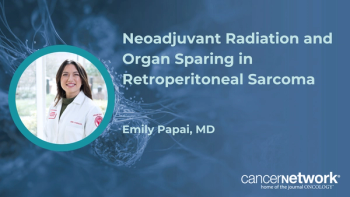
Promising Efficacy and Safety Profile Seen With Concurrent Ibrutinib and Venetoclax for R/R Mantle Cell Lymphoma
Phase 3 data suggest that concurrent treatment with ibrutinib and venetoclax yielded promising efficacy for patients with relapsed/refractory mantle cell lymphoma.
A concurrent combination of ibrutinib (Imbruvica) plus venetoclax (Venclexta) yielded promising efficacy with no new safety signals in a population of patients with relapsed/refractory mantle cell lymphoma (MCL), according to results from ongoing the phase 3 SYMPATICO trial (NCT03112174) published in the Journal of Hematology & Oncology.
No clinical cases of tumor lysis syndrome (TLS) were reported in the patient population following treatment. However, 1 female patient who had an increased risk of developing TLS had onset laboratory TLS on the second day of treatment. Dose-limiting toxicities (DLTs) were seen in 3 patients.
Additionally, the ORR for the entire cohort was 81% (95% CI, 58%-95%) regardless of TLS risk. A complete response was seen in 62% (95% CI, 38%-82%) of patients, and all 11 patients with detectable baseline minimal residual disease (MRD) achieved undetectable MRD following treatment. The median duration of response was 32.3 months (95% CI, 26.5–not estimable [NE]). The median progression-free survival (PFS) was 35.0 months (95% CI, 13.7-NE) and the estimated 30-month PFS rate was 60% (95% CI, 31%-80%). The median overall survival was 35.0 months (95% CI, 20.7-NE).
“Results from the [safety run-in (SRI)] of the SYMPATICO study demonstrate that the combination of ibrutinib plus venetoclax is well tolerated and can be safely administered in patients with relapsed/refractory MCL, without the need for an ibrutinib lead-in,” the investigators wrote. “To our knowledge, this is the first time that concurrent administration of this treatment combination has been investigated.”
Patients in the SRI cohort were aged 18 years or older with pathologically confirmed MCL. Other eligibility criteria included 1 or more sites of disease of 2.0 cm or greater and 1 to 5 prior MCL therapies featuring at least 1 rituximab (Rituxan)/anti-CD20-containing regimen. An ECOG performance status of 0 to 2 was also required.
Concurrent treatment began on day 1, with patients receiving ibrutinib orally at 560 mg once daily and venetoclax starting at 20 mg and increasing over a 5-week period to a target dose of 400 mg. Treatment continued for 2 years followed by single-agent ibrutinib once daily until disease progression, unacceptable toxicity, or death.
The primary end points of the study were TLS occurrence and DLT events. Secondary end points included ORR, PFS, duration of response, and safety.
Twenty-one patients were enrolled in the SRI cohort, 6 of whom had a low risk for developing TLS and 15 had an increased risk. The median patient age for the overall population was 68 years (range, 53-84) and 62% of patients were male. All patients had disease progression and at least 1 lesion of more than 2.0 cm. Detectable MRD in peripheral blood or bone marrow was seen in 11 patients at baseline. The study had a median follow-up of 31 months.
Most adverse effects (AEs) were grade 1 or grade 2. Grade 3 or higher AEs included infection (n = 8), diarrhea (n = 7), neutropenia (n = 7), atrial fibrillation (n = 1), and hemorrhage (n = 1_.
“This combination represents a once-daily, all-oral chemotherapy-free regimen for patients with relapsed/refractory MCL,” the investigators concluded.
Reference
Wang M, Ramchandren R, Chen R, et al. Concurrent ibrutinib plus venetoclax in relapsed/refractory mantle cell lymphoma: the safety run-in of the phase 3 SYMPATICO study. J Hematol Oncol. 2021;14(1):179. doi:10.1186/s13045-021-01188-x
Newsletter
Stay up to date on recent advances in the multidisciplinary approach to cancer.







































